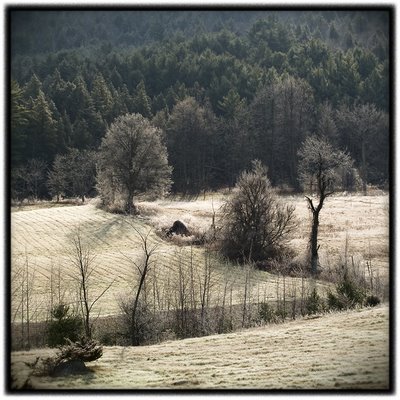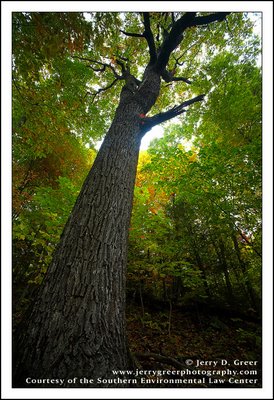 A cold frosty late November morning.
A cold frosty late November morning.Last week over at
Photo-Musings, Paul Butzi raised the topic of "talent". He stated, "
I think the whole talent thing is a myth. At least, I think that talent is vastly over-rated....the myth is that talent is a substitute for hard work..."
The point that Paul seems to be making is, "
doing your best is hard work...do the best work you can. Talent or no talent, that's all any of us can do..." I find it difficult to disagree with the proposition to, as they say in the Army, "be all that you can be".
BUT...(with me it seems like there's always a "but")
...I find it not nearly as difficult to disagree with the notion that "talent is vastly over-rated", in part because this idea seems to lead to the proposition that "...
talent is a set of skills that you develop over time through desire" - a related but highly suspect statement made by Craig Tanner in his essay
The Myth of TalentThe notions that "talent is vastly over-rated" and that "talent is a skill set" are rather dangerous ideas for 2 reasons:
reason # 1 - IMO, a true talent for something - that unbidden preternatural inner-being "gift" - is precious,
relatively rare and very
real. Not understanding that this so tends to denigrate the special-ness of a truly unique talent vis-a-vis a "small" talent. (FYI, I am not using the word "small" as a put-down because after all, as Paul Butzi also states, "...
photography and art aren't a race..." or a competition, but this recognition does not negate the fact that some art is "large" in impact/influence/significance while other art is "small" in impact/influence/significance.)
I appreciate the manifestations of "small" talent very much but there is also a somewhat greater intangible "thrill" of discovery which I expereience when I am
confronted the works of a very unique talent. This talent is a thing to be highly "celebrated" and often is by its display in books, galleries and museums.
On a side note, perhaps the web is a big gallery where all talent gets it due.
reason # 2 - I would also opine that talent is a fragile thing - the greatness of the artist's individuality that, if not recognized, fostered and encouraged to flourish, can, in the course of "hard work", wither on the vine. As H.D. Thoreau stated, "
What does education often do? It makes a straight-cut ditch of a free, meandering brook.", or, as Einstein stated, "
Imagination is more important than knowledge."
Confusing craft (skill sets) with talent is a big mistake. A skill set must
work in the service of talent.
IMO, the American educator and painter Robert Henri made the point very clearly in his 1923 vintage book
The Art Spirit - "
The greatness of art depends absolutely on the greatness of the artist's individuality, and on the same source depends the power to acquire a tecnhique sufficient for expresion."
He goes on to discuss the inherent dangers of "developing a skill set" - "
The man who is forever acquiring technique with the idea that sometime he may have something to express, will never have the technique of the thing he wishes to express...the technique learned without a purpose is a formula when used, knocks the life out of any idea to which it is applied.IMO,
talent is an
inner resource that has more to do with an insatiable curiousity and a drive to "see" beneath the surface of things than it does with the desire to acquire skill sets. IMO, artists who foster and explore that unbidden burning curiousity and drive - the greatness of their individuality
as a person - are those who most often create new ways of "seeing" life (sometimes with a new technique). New ways of "seeing" that have the greatest impact not only visually, but on the notion of what it means to be human - art that is truly meaning full.
PS - the fact that this commentary immediately precedes (in the scrolling scheme of things) Eric Fredine's photograph is not a coincidence. IMO, his comments speak to the heart of the talent matter.
FEATURED COMMENT Paul Ralphaelson wrote: "
Several years ago some researchers went looking for talent among the applicants at a major British music conservatory. They were hoping to find examples of the Mozart phenomenon--musicians who soared above everyone else with precious little work.
What they found startled them: an almost exact correlation between the time spent practicing and studying and their admissions ranking. They also found an almost ten-to-one difference in practicing time between the hardest and least hardest working applicants.
In one sense, this challenges the notion of talent. In another sense, I'd suggest that capacity for relentless work IS a kind of talent. How many people walking the earth are actually capable of practicing piano for 60 hours a week, year after year, without burning out, collapsing from repetetive stress injuries, or going crazy?
I suspect it's very, very few. These great musicians exhibit genius-level obsession for working at their craft. I think you'll find similar examples in all the arts. Some photographers never leave the house without a camera. Some can't even face the world without a camera between them and reality ... their obsession leve seems almost like a kind of autism. The obsessive greats are out with their cameras while bums like me are sleeping in, going to cock fights, and running around with loose women.publisher's comment - Paul R. brings up a point that I thought to put in my commentary but did not because I thought it was getting a little long. The point is this - In his commentary, Paul B. wrote about "hard work" as a means to doing the best you can do - to which I would add,
with the talent you have. No question about that.
Paul R. writes about a "genius-level obsession" capacity for working at a craft, but this is NOT what I would call "hard work". I have no doubt that many (if not most) in the arts who are considered "large" talents are, in fact, obsessive about their art, but, while they may work to near exhaustion at times, I'd be surprised if many called it "hard work". Without implying anything about the measure of my talent, I can say that while I "work" at photography very "hard" and long, I really do enjoy every minute of it - even when I'm weaving a tapestry of computer/software-driven obscenities that hangs over the Adirondacks like a dark vaporous cloud, I have to admit, it feels much more like "play" than "work". Please don't tell my wife.
There is way more pleasure than pain. More like sleeping, going to cock fights, and running around with loose women. (Please don't tell my wife)
 Wednesday, November 29, 2006 at 08:37AM
Wednesday, November 29, 2006 at 08:37AM 






